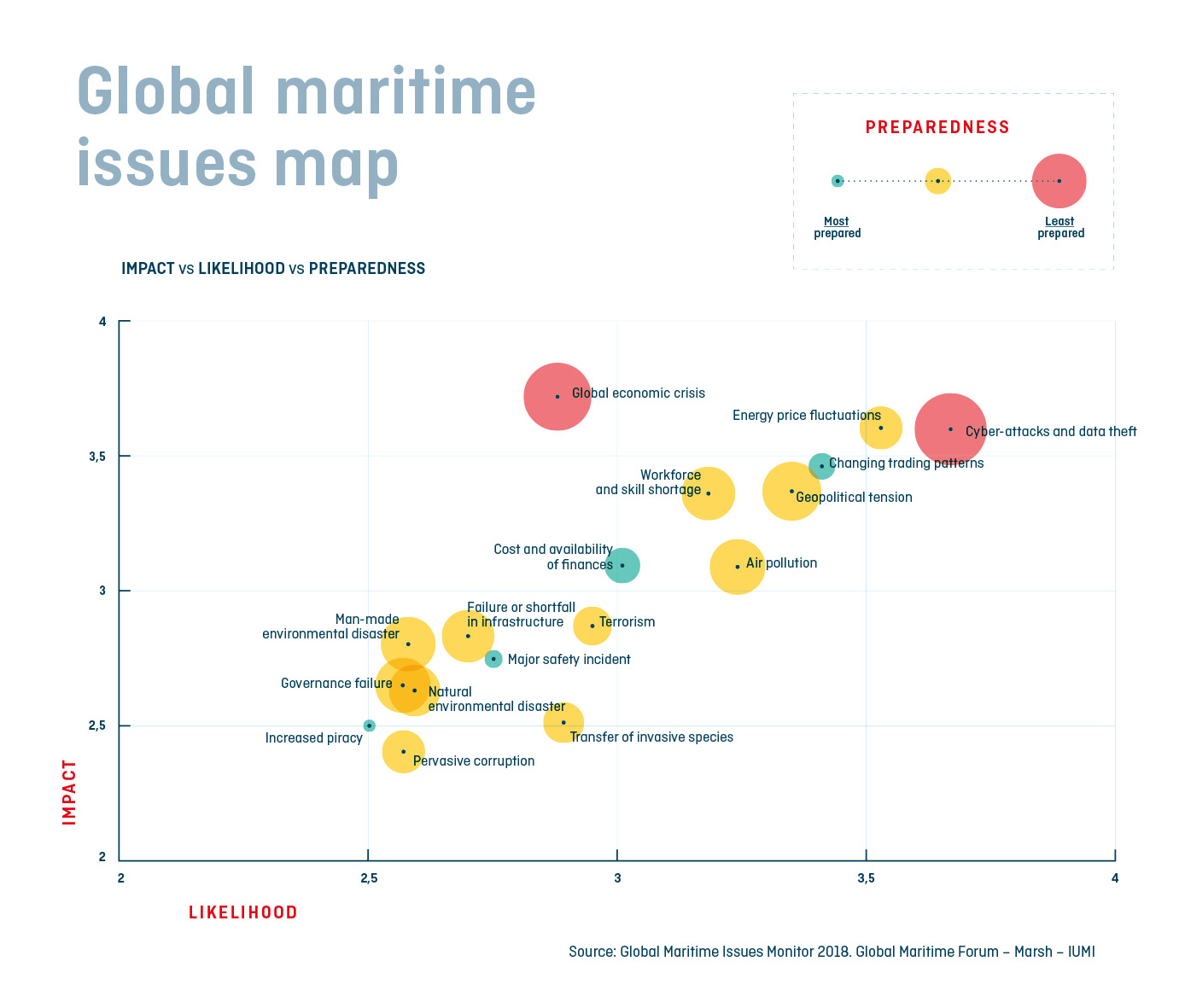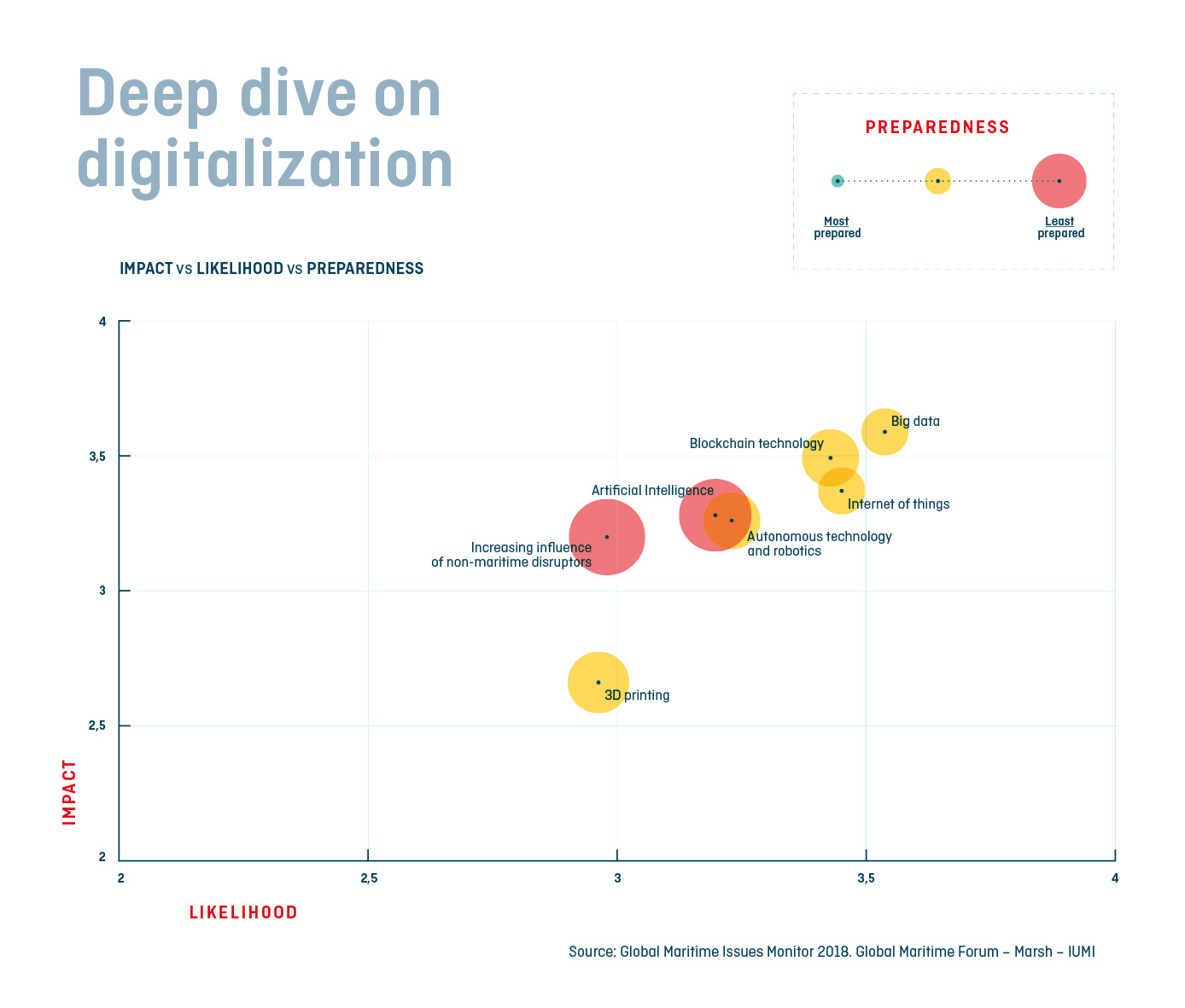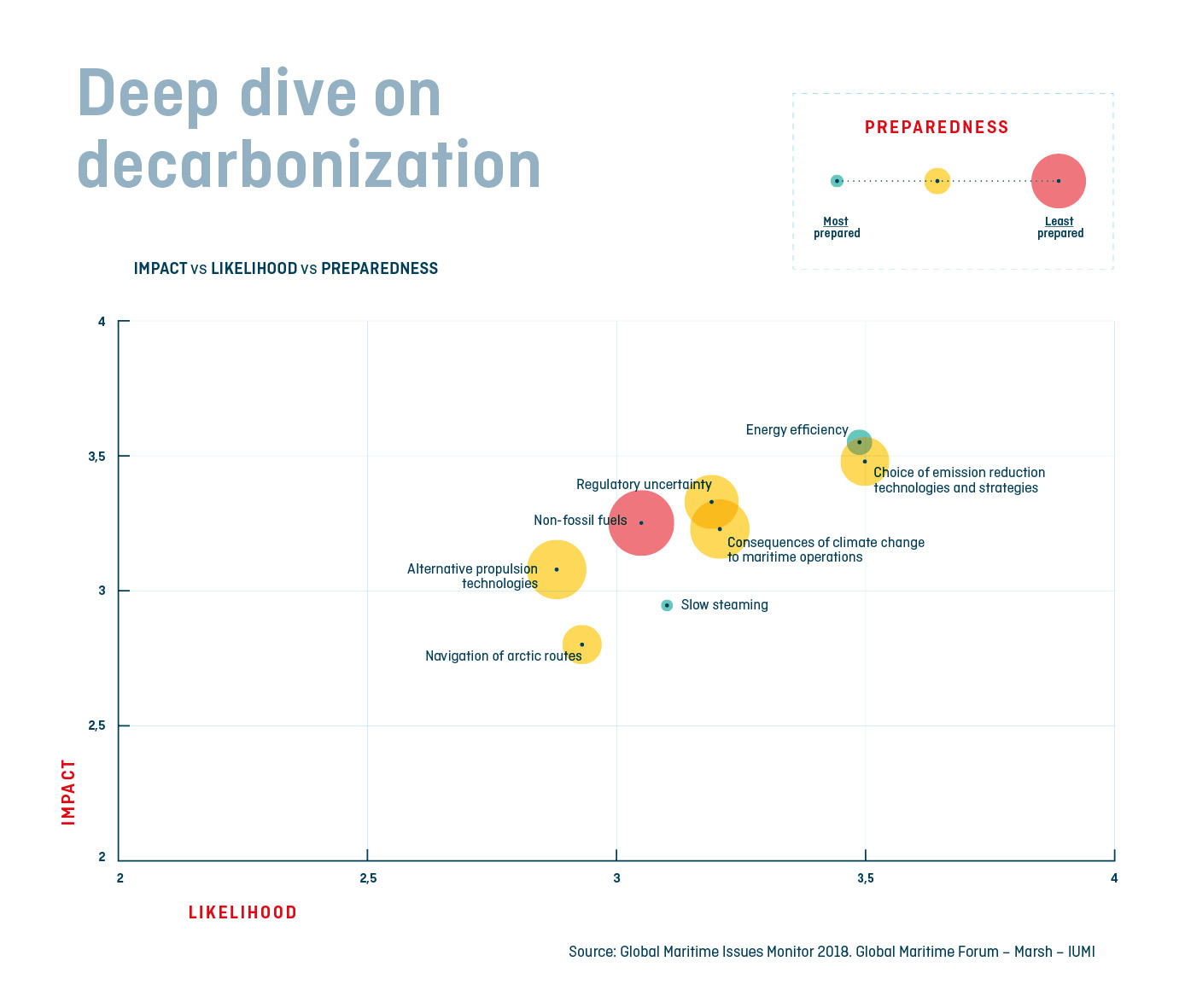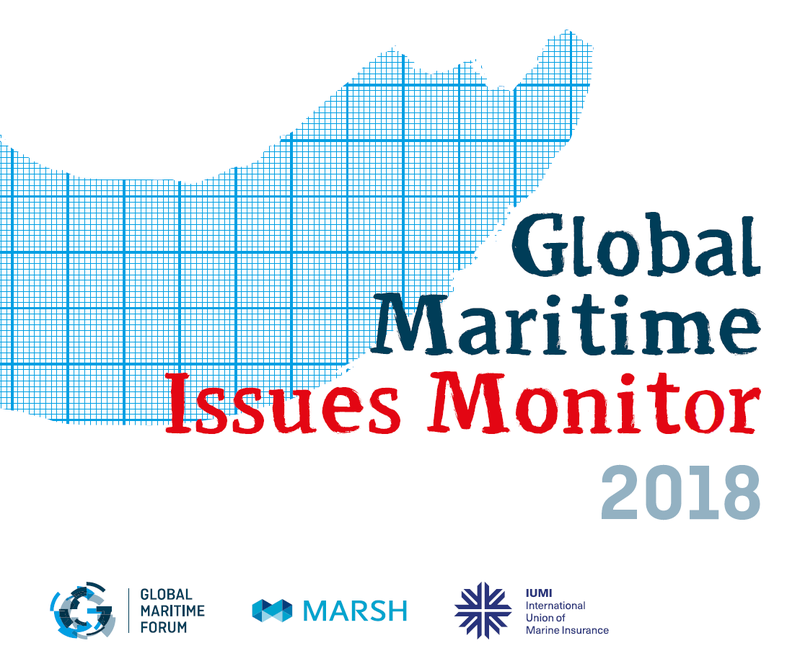- Economic issues dominate maritime agenda; impact of future ‘global economic crisis’ ranked as most severe in 10-year outlook.
- ‘Cyber-attacks and data theft’, ‘energy price fluctuations’, and ‘changing trading patterns’ most likely to occur. Less concern among stakeholders of ‘increasing influence of non-maritime disruptors’.
- Viable solutions to decarbonization are still perceived as in the future.
Senior stakeholders believe that the global maritime industry is not prepared to deal with major issues that are likely to impact it over the next ten years. This is according to the Global Maritime Issues Monitor 2018, published today by the Global Maritime Forum, global insurance broker and risk adviser Marsh, and the International Union of Marine Insurance (IUMI).
The first industry report of its kind, the Global Maritime Issues Monitor 2018 examines the impact and likelihood of 17 major issues based on research among senior maritime stakeholders across over 50 countries globally. According to the research, the maritime industry does not appear to be prepared for any of these issues. Worryingly, this is amplified by the fact that the issues the industry are least prepared for are the ones deemed to have potentially the biggest impact on the sector.
“The difference between a risk and an opportunity is how soon you discover it. The Issues Monitor shows that there is a need for a greater awareness of the long-term forces shaping our decision-making and the Global Maritime Issues Monitor can in this perspective be seen as a modest contribution to a thorough understanding of the current state of affairs,” says Peter Stokes, Chairman of Global Maritime Forum.
The five issues that the maritime industry appears to be least prepared for are ‘cyber-attacks and data theft, ‘global economic crisis’, ‘geopolitical tension’, ‘air pollution’ and ‘governance failure’.

Top issue: Cyber-attacks and data theft
‘Cyber-attacks and data theft’ appear to be the maritime industry’s Achilles’ heel. In addition to being ranked as the top issue that the industry is least prepared for, executives believe it has the highest likelihood of occurring and is only surpassed by a ‘global economic crisis’ and ´energy price fluctuations’ in terms of impact.
“Emerging digital technologies are both challenging conventional business models and creating new opportunities for the global maritime industry. But, along with its transformative power, this digitalization is creating rapidly evolving risks such as cyber-attacks and data theft. It is worrying that, despite recent high-profile attacks, the industry is failing to get to grips with cyber risk. By taking a more strategic approach, firms are better positioned to capitalize on these opportunities, while protecting their people and assets from digital threats,” says Marcus Baker, Chairman of Global Marine Practice at Marsh.
Apart from ‘cyber-attacks and data theft’, economic issues such as ‘global economic crisis’, ‘energy price fluctuations’, and ‘changing trading patterns’ dominate among the top issues of the maritime industry.
Deep dive on digitalization: No fear of non-maritime disruptors
According to the research, the ‘increasing influence of non-maritime disruptors’ does not seem to keep senior maritime stakeholders awake at night. In the Issues Monitor’s deep dive on digitalization, the issue is ranked number six out of seven both in impact and likelihood, placing higher only than ‘3D printing’. It is also the issue for which the maritime industry feels the least prepared.
This does not reflect the growing influence of data-based companies and the increasing power of data in our society. Whether barriers to entry into the maritime industry are simply too big or the profit margins too low to attract new entrants, or whether key maritime stakeholders are not sufficiently informed on the potential risks involved, is an open question.

Deep dive on decarbonization: No quick fix in sight
Reducing greenhouse gas emissions is a major challenge for the maritime industry; viable alternatives to traditional fuels and propulsion technologies are required to succeed in this. In the Issues Monitor’s deep dive on decarbonization, ‘non-fossil fuels’ and ‘alternative propulsion technologies’ - both potential pathways towards zero-emission vessels - are perceived to be less significant in impact and likelihood over the next 10 years. This is further confirmed by the industry’s low ranking of its perceived preparedness for both issues: ‘non-fossil fuels’ were given the lowest preparedness score of the section, with ‘alternative propulsion technologies’ ranking in third lowest place.
“The development of non-fossil fuels and alternative propulsion technologies is a prerequisite if the maritime industry is going to achieve a reduction in greenhouse gas emissions by at least 50% by 2050 as stated in the IMO’s initial climate change strategy. It is one of the industry’s biggest challenges in our lifetime and will require innovation, collaboration and investment from all stakeholders,” says Richard Turner, President of IUMI.

Read the full Global Maritime Issues Monitor 2018 here.
For any further information, please contact Head of Communications Torben Vemmelund at tve@globalmaritimeforum.org or +45 2224 1446.
About the Global Maritime Issues Monitor 2018
The first industry report of its kind, the Global Maritime Issues Monitor 2018 takes a global look at 17 major issues that are likely to impact the global maritime industry. The Issues Monitor is based on research among senior maritime stakeholders from more than 50 countries, and their perceptions on the impact, likelihood, and preparedness on a number of issues potentially affecting the global maritime industry. The report also undertakes deep dives into the emerging trends in digitalization and decarbonization.
About the Global Maritime Forum
The Global Maritime Forum is an international not-for-profit foundation committed to shaping the future of global seaborne trade to increase sustainable long-term economic development and human wellbeing. To serve its mission, the Forum convenes leaders from across the maritime community with policymakers, NGOs, experts, and other influential decision-makers and opinion shapers from all geographies in a community of purpose to discuss collective challenges and to work together on developing new solutions and recommendations for action. In order to do so, the Forum identifies, develops and shares new insights and key issues on the global agenda and facilitates collaborative projects and initiatives that can deliver long-term impact and sustainable change.
About Marsh
A global leader in insurance broking and innovative risk management solutions, Marsh’s 30,000 colleagues advise individual and commercial clients of all sizes in over 130 countries. Marsh is a wholly owned subsidiary of Marsh & McLennan Companies (NYSE: MMC), the leading global professional services firm in the areas of risk, strategy and people. With annual revenue over US$14 billion and nearly 65,000 colleagues worldwide, MMC helps clients navigate an increasingly dynamic and complex environment through four market-leading firms. In addition to Marsh, MMC is the parent company of Guy Carpenter, Mercer and Oliver Wyman. Follow Marsh on Twitter @MarshGlobal; LinkedIn; Facebook; and YouTube, or subscribe to BRINK.
About IUMI
The International Union of Marine Insurance e.V. (IUMI) is a non-profit association established for the purpose of protecting, safeguarding and advancing insurers’ interests in marine and all types of transport insurance. The roles of IUMI are to: act as a focal point and representative voice on behalf of the marine and transport insurance industries in dialogue with all interested parties; share information and research that are non-commercially sensitive with regard to marine and transport insurance; bring together marine insurance practitioners to facilitate the exchange of technical information and best practice; and provide information on positions taken by IUMI.

